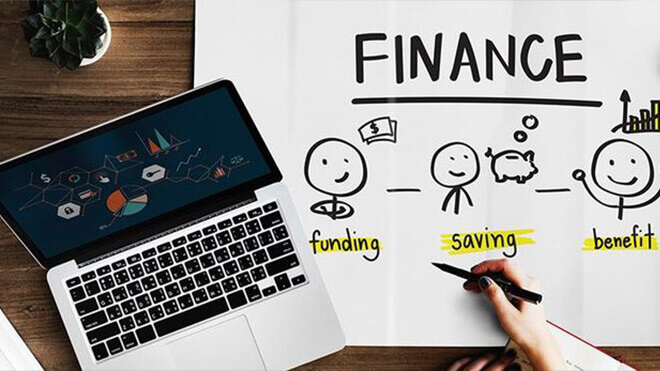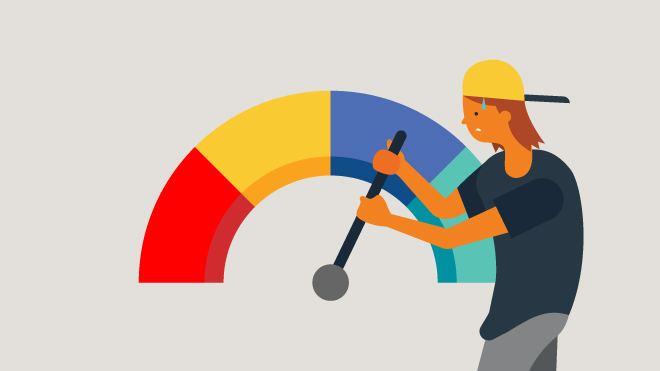
11 Money Management Tips: How To Get Started
The basics of money management aren't just for newbies. Sometimes life changes can bring financial changes, too. This Financial Capability Month, get started on building a solid foundation and working toward your goals.
Being an excellent money manager is a lifelong pursuit for many of us, and how you manage your finances depends a lot on your individual circumstances.
If you're struggling to make ends meet, little challenges can quickly add up to big problems. If you're at a stage in your life where you're setting goals — maybe you want to buy a house, have a baby, go to grad school or even retire someday — you might be taking a closer look at where your money goes and how to make it go farther.
These are 11 essential tips for how to manage money that I wish I knew earlier, and that I teach my students (and my adult kids).
1. Track Your Spending
This is my No. 1 tip for a reason. You have to know how much you spend and what you spend it on before you can wrangle your finances. It's also how you'll decide where to cut back if you need to.
With all the electronic payment options available, I find it can be more difficult for some people to know where their money goes. You can just tap or swipe to make a purchase and not think much about it — until your credit card bill comes or your checking account balance is dangerously low.
But you don't have to switch to all cash to feel connected with your finances. You just have to develop good record-keeping habits to go along with those spending habits. There are tons of digital methods available, like BECU Money Manager for BECU members, Goodbudget, Quicken Simplifi or YNAB, just to name a few.
You can also use a manual method — just carry a notebook and jot down everything you buy and how much it costs. This is my preferred method because it makes me feel accountable every time I spend money.
Tracking expenses is a first step to building a budget, that you can work up to. For now, start with tracking.
Tips for Tracking Spending
- Categorize every expense or adjust the categories your app or website automatically assigns to your purchases.
- Go back at least two months; a year is better.
- Note your big expenses — how much they were for and when you paid them. Did you have to pay taxes in April? Do you pay car and home insurance twice a year?
- Review how much you spent in each category.
- Don't double-count credit card payments. Add up only the charges to your credit card, not the payments from your checking account to your credit card bill.
2. Add Up Your Income
This is straightforward if you have only one job and you earn a regular salary.
If you pool your income and expenses with a spouse or partner, or if you are paid hourly, have an inconsistent work schedule, earn tips or have a side gig, it can be more complicated.
If your income is irregular, add up a year's worth and divide it by 12 to get a monthly average.
3. Coming Up Short? Close the Gap
It's not your imagination. Inflation has driven up costs of everyday expenses like groceries, gas and utilities. Even if you haven't changed your spending habits, your expenses are probably higher and your income might not be going as far as it used to.
If your total income is less than your total expenses, you have two options to reduce debt and save for big goals: Spend less or make more money.
If only it were so easy, right? Here are a few things you can try:
Try To Spend Less
First, look at your largest expense categories to find the biggest opportunities to reduce spending. Don't include rent or mortgage payments for now. (Worst-case, you might have to consider reducing your housing costs, but that often means a major life change, so I'll cover that separately in a bit.)
Start with the non-essentials, like vacations, recreation, dining out and gifts. Then move on to things like subscriptions, insurance premiums and cellphone service. Are any of these optional? Could you get a better rate with a different provider?
I always recommend cutting back, not cutting out: Make sure you set aside at least a little money for fun. Otherwise, you might splurge and end up increasing your debt.
Try To Make More
If you can't close the gap by trimming your expenses, think about how you might be able to increase your income.
Maybe you could ask your current employer for a raise or what the path is to getting a promotion.
If a pay increase is unlikely where you work now, looking for a new job might be a quicker way to increase your income, since job switchers tend to make more.
If you have time and skills, maybe you could also start a side gig to supplement your income.
4. Build an Emergency Fund
An emergency fund can help you cover a sudden loss of income or large unplanned expense. Common uses of emergency funds include car repairs, household expenses and medical expenses.
Three to six months of essential expenses is a common emergency fund target. Commit to saving every month, even if you can only commit a small amount. Start with a micro-goal, like $100 and build on it consistently over time.
5. Pay Bills On Time Every Month
Paying your bills on time can reduce late fees and finance charges and improve your credit.
Keep track of when your bills are due and estimate how much they will be. Note when bill payments are processed. This can prevent you from overdrawing your account by making a purchase right before a large bill payment clears.
Setting up auto pay for your bills can help you make timely payments, but only take this step if you know you have enough money in your checking account to cover your payments and other expenses.
6. Use Separate Accounts for Spending and Savings
Use a checking account for daily transactions and bills and a savings account to stash extra money and save up for your goals.
You can open multiple accounts or use a digital tool like BECU Envelopes to organize your savings for different uses.
7. Be Intentional About Debit vs. Credit
Debit and credit cards might seem like similar ways to pay for your purchases, but choosing intentionally which one you use can make money management easier.
When To Choose Debit
Your debit card is linked directly to your checking account. Just like spending cash in your pocket, when it's gone, it's gone.
I recommend paying with a debit card for everyday purchases if you are new to managing your money because the most you can spend is the money you have in your account. That seems to make it harder for people to overspend and go into debt. (Some financial institutions, like BECU, have ATM and transaction limits to help protect your account from fraud.)
Be aware of any upcoming bills you have set up to autopay from your account, so you don't accidentally spend more than what's in your account.
When To Choose Credit
Using your credit card is a lot like taking out a loan. Keep in mind that your credit limit might be higher than what you can realistically afford to pay back at the end of the month.
If you pay off the balance of your credit card purchases every month, your "loan" is interest free. But if you charge more than you can afford to pay, you'll have to pay back what you borrowed plus interest and any finance charges. Those can really add up. I know how frustrating that can be. It probably took me years to pay off a few shoe purchases, long after I had worn them out.
A credit card is good for:
- Everyday expenses if you know you have enough money in your account to pay it off monthly. This also is a good way to build credit.
- Bigger purchases that you can't afford to pay for all at once, as long as you have a plan for paying off your balance over time. But it's best to plan ahead and save for these purchases so you can pay off your credit card balance and won't have to pay interest.
- Emergencies, but just like bigger purchases, it's best if you can prioritize saving for emergencies in an emergency fund so you don't have to rely on your credit card.
- More security because if your account information falls into the wrong hands, you can cancel your card, dispute the charges and file a claim to seek reimbursement. Unlike credit cards, debit card transactions draw money directly from your account, so even if you catch it early and file a claim, you may not have money available until the issue is resolved.
8. Pay Off Credit Card Debt
One of the most common questions I'm asked by students is how to pay off credit card debt.
Start with the tips above — track your spending, understand your expenses and take stock of your income. Then choose a payment strategy that works for you, such as the debt snowball, debt avalanche or debt cascade.
Whatever method you choose, be sure to make at least the minimum payments each month.
A word of caution: An aggressive payment strategy is great, but not too aggressive. You don't want to pay too much and end up without enough money to cover your expenses. Saving is still important!
9. Reduce Housing Costs
Housing is often the biggest expense for people — and often difficult to change. But the less you spend on housing, the more you can commit to other expenses and savings.
Try to keep your rent or mortgage payments at or below 30% of your income. I know that can be challenging, especially in high-cost areas like here in Seattle.
If you're saving to buy a new home, remember that you'll likely have to pay for insurance and taxes on top of your mortgage payment. And just like your credit card limit, be cautious about how much you borrow: You might get approved for a loan that is more than you can afford.
10. Save for Your Future
If I could go back in time and give myself advice, I'd tell myself to start saving for retirement sooner.
Look ahead to what future-you wants to do. Set your goals and start saving as soon as you can.
Research types of accounts you can use to save for different goals. Look into interest rates and tax advantages, and consider when you will need your money.
Here are a few examples of savings goals and the types of accounts you might consider to reach them:
- House down payment: Saving for a down payment on a house in, say, one to five years? A certificate of deposit typically pays higher interest rates than a traditional savings account. You can choose the CD based on the rate and when you need the money. You likely will pay a penalty for early withdrawal. (I don't recommend using a CD for your emergency fund because you should always have immediate access to that pool of money.)
- College: A 529 plan is one type of college savings account. You can contribute to the account and earn interest tax-free as long as you use the money for IRS-approved higher-education expenses such as tuition, books, room and board.*
- Retirement: Employers that offer 401(k) plans may match some of your contributions. You can also open your own individual retirement account, or IRA, with a financial institution.
11. Get Support
Maybe you're a wiz who can master money management after reading one blog post, but don't feel like you need to go it alone. A lot of people need a little help.
Here are a few resources to get you started:
- Budgeting and goals: BECU members can sign up for a free Financial Health Check consultation with a trained specialist to get help with increasing savings, reducing debt and organizing finances.
- Credit and debt counseling: GreenPath Financial Wellness offers free financial advice on managing and consolidating debt.
- Online learning: Continue your financial education with free BECU seminars and webinars and EverFi financial education modules.
*The above article is intended to provide generalized financial information designed to educate a broad segment of the public; it does not give personalized financial, tax, investment, legal, or other business and professional advice. Before taking any action, you should always seek the assistance of a professional who knows your particular situation when making financial, legal, tax, investment, or any other business and professional decisions that affect you and/or your business. Linked third parties are solely responsible for the delivery and quality of their products and services. BECU does not guarantee nor expressly endorse any particular product or service.


